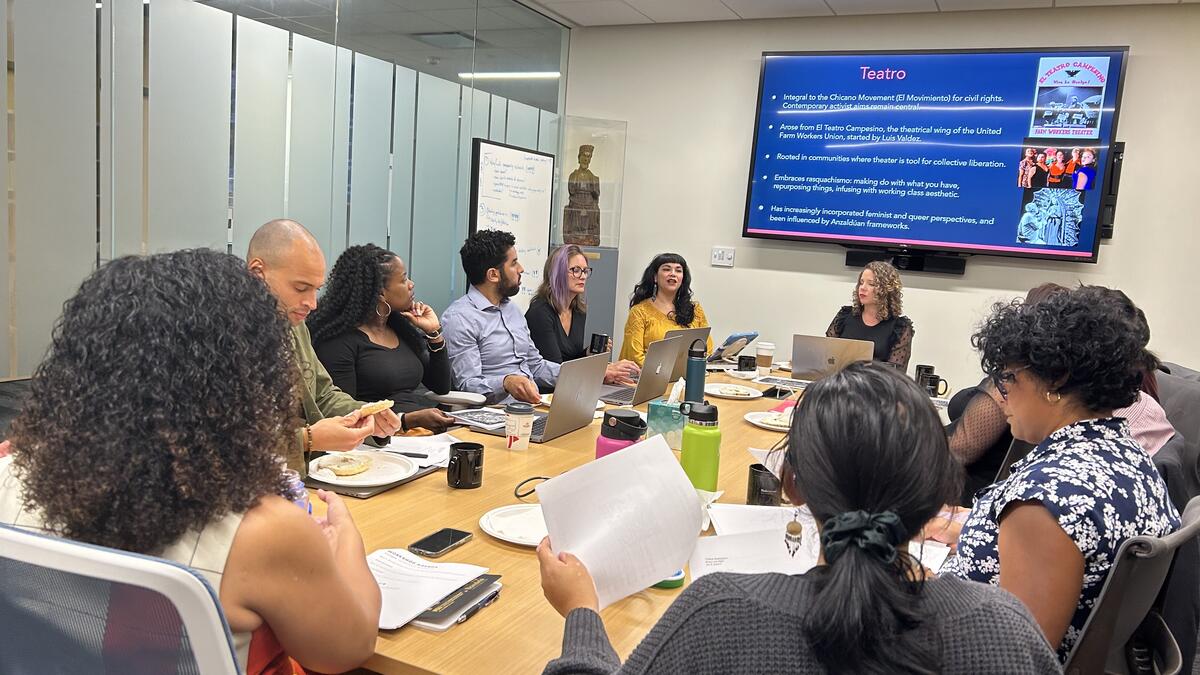Humanities projects receive funding for Latino research and scholarship

The Arizona Center for Medieval and Renaissance Studies working group, Bridging the Shakespeare–Latinx Divide, holds its first meeting.
Three project teams of principal investigators at Arizona State University have received funding from the Crossing Latinidades Humanities Research Initiative, a subaward of the Andrew W. Mellon Foundation, at the University of Illinois Chicago.
The working groups are:
Bridging the Shakespeare–Latinx Divide: Principal Investigators Ruben Espinosa, ASU; Ayanna Thompson, ASU; Kyle Grady, University of California, Irvine; and Joseph Ortiz, University of Texas at El Paso.
The Latinx Past: Archive, Memory, Speculation: Principal Investigators Kirsten Silva Gruesz, University of California, Santa Cruz; Vanessa Pérez-Rosario, CUNY Graduate Center and Queens College; and Anita Huizar-Hernández, ASU.
Race Laws in the U.S. Southwest: Research Working Group to Document Laws and Their Impacts 1836–Present: Principal Investigators Monica Muñoz Martinez, University of Texas at Austin; Julian Lim, ASU; and Ana Elizabeth Rosas, University of California, Irvine.
Housed within the Arizona Center for Medieval and Renaissance Studies at ASU, the Bridging the Shakespeare–LatinxA gender-neutral term preferred by some for Latinos and Latinas. Divide working group will collaborate, share research, organize symposia and change the face of early-modern literary studies.
The three doctoral fellows in each of the project’s two years will participate in, and curate the speakers and specific themes for, each of the two symposia. In this way, they actively guide the conversations about the value of Latino studies in the ongoing shaping of Shakespeare and early-modern studies for Latino students.
The project team’s aim is to show these students why their analyses, performances and adaptations of Shakespeare can transform the field by fostering cross-institutional and cross-regional dialogues within the humanities about national and linguistic identity, immigration, race, ethnicity, economics, ethics, citizenship and social justice — all issues that define, in part, the Latino experience in the U.S.
“There is vibrant history of Latina/o/x engagement with Shakespeare — from Teatro Campesino to Cantinflas, from local adaptations in la frontera to major productions at the Public Theater in New York, from the fiction of Emma Perez to that of Arturo Islas,” said Espinosa, associate director at the Arizona Center for Medieval and Renaissance Studies and associate professor in the Department of English.
“This working group will, in part, interrogate how these Latino/a/x intersections with Shakespeare open doors to reimagine not only Shakespeare’s cultural capital, but also the relevance of Latino/a/x studies to humanistic inquiry more broadly.”
Housed at the University of California, Santa Cruz, The Latinx Past: Archive, Memory, Speculation working group will both study and utilize through practice the geographically dispersed collections of multilingual documents and multimedia objects that constitute the Latino archive.
The group aims to produce new modes of thinking about the Latino past by engaging models of temporality that do not presume common origins or unbroken continuities and traditions. Realizing the potential of this grant’s “Crossing Latinidades” theme, it will circulate knowledge among scholars at different career stages who come in with varying regional and ethno-national interests.
A group of six core faculty will share with the graduate fellows a scaffolded set of activities that will begin each year with monthly meetings as a reading group, move through multiple virtual and in-person archive visits and culminate in presentations of original work at public symposia.
“One of the main goals of our working group is to rethink how we approach the Latinx past not only as scholars but also as teachers,” said Huizar-Hernández, associate professor in the School of International Letters and Cultures.
“I'm especially happy to bring this work to ASU, which is where I began my own studies as an undergraduate many years ago.”
The Crossing Latinidades Humanities Research Initiative is a product of the new Alliance of Hispanic Serving Research Universities consortium, which includes all 20 Hispanic-Serving Institutions in the U.S. that have the R1 designation. The consortium focuses its efforts on increasing the number of Latino students pursuing doctoral degrees and advancing to academic positions.
Award recipients will receive $310,000 and support from six doctoral fellows. In addition, each principal investigator will receive one course release per year for two years.
“ASU’s designation as a Hispanic-Serving Institution recognizes our continual efforts to expand educational access for our diverse student population. I’m thrilled to see faculty throughout the humanities division who are taking this call for inclusion and accessibility to heart by developing new opportunities for Latinx doctoral students,” said Jeffrey Cohen, dean of humanities at The College of Liberal Arts and Sciences.
“These fellowships will not only provide these students with essential research experience but will also inform the future of the humanities discipline with their unique perspectives and backgrounds.”
Leah Newsom contributed to this story.
More Arts, humanities and education
AI literacy course prepares ASU students to set cultural norms for new technology
As the use of artificial intelligence spreads rapidly to every discipline at Arizona State University, it’s essential for…

Grand Canyon National Park superintendent visits ASU, shares about efforts to welcome Indigenous voices back into the park
There are 11 tribes who have historic connections to the land and resources in the Grand Canyon National Park. Sadly, when the…
ASU film professor part of 'Cyberpunk' exhibit at Academy Museum in LA
Arizona State University filmmaker Alex Rivera sees cyberpunk as a perfect vehicle to represent the Latino experience.Cyberpunk…